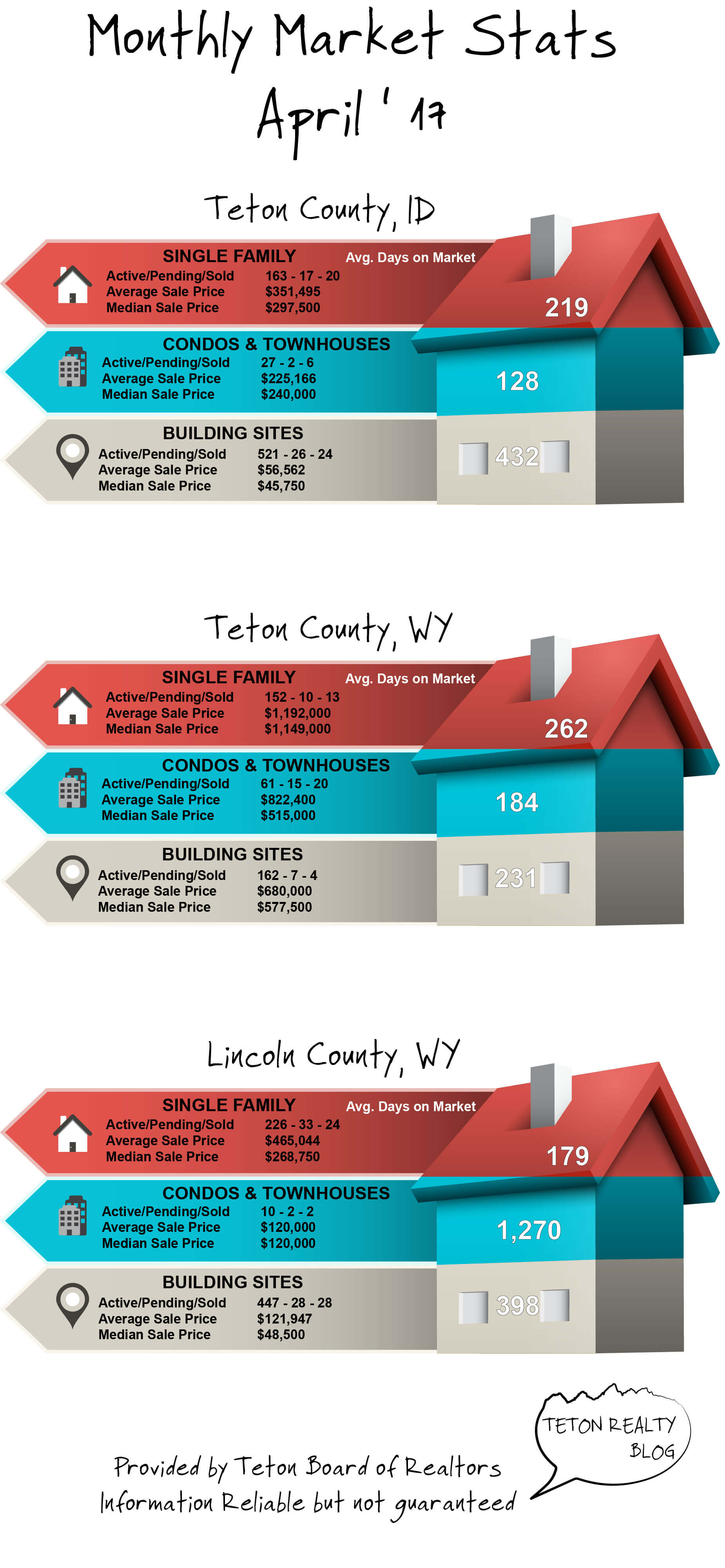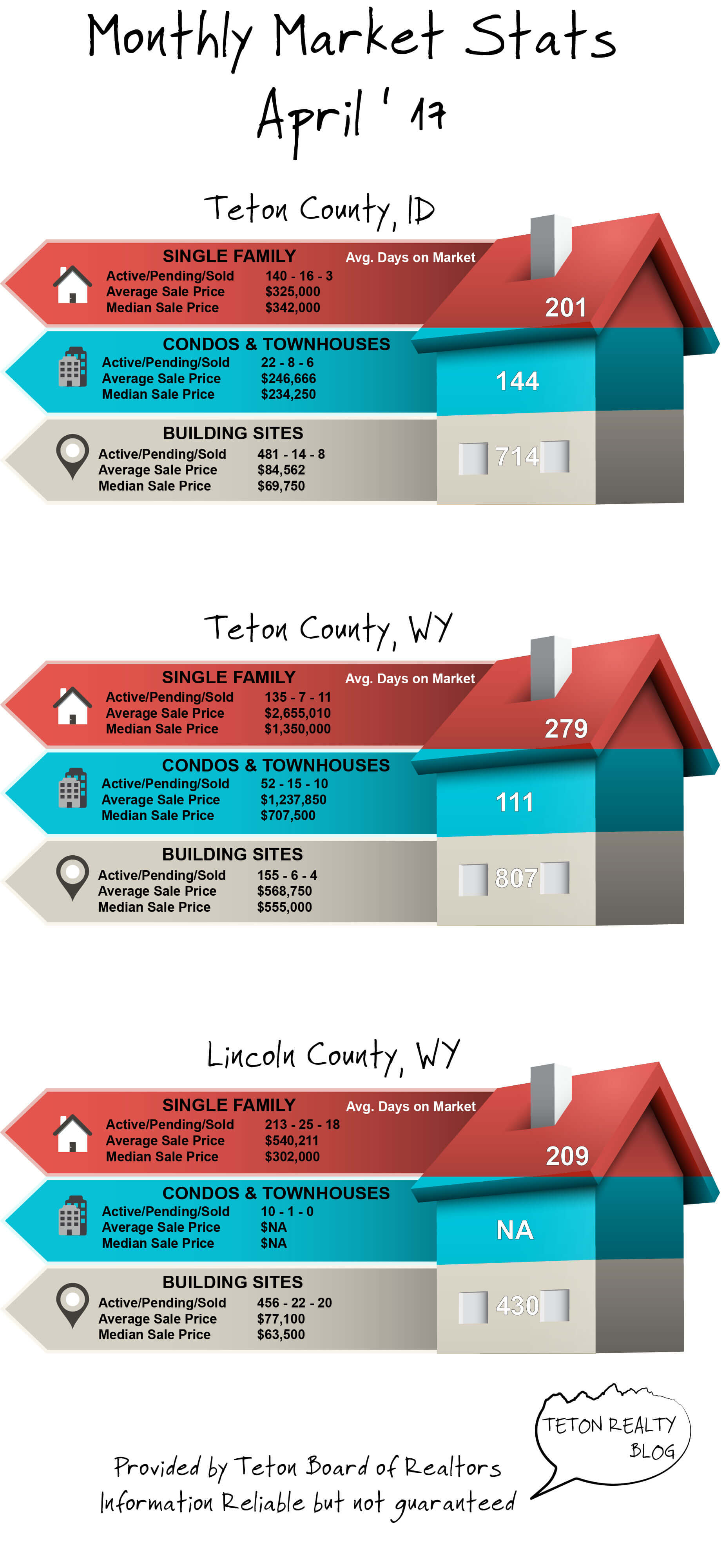May was a busy month in Teton County, Idaho and Lincoln County, Wyoming. Teton Valley saw 26 residential sales with 19 transaction pending sale. Star Valley had an even bigger month with 26 residential sales and 35 pending transactions.

Teton Region Real Estate Market Stats, Articles & News
May was a busy month in Teton County, Idaho and Lincoln County, Wyoming. Teton Valley saw 26 residential sales with 19 transaction pending sale. Star Valley had an even bigger month with 26 residential sales and 35 pending transactions.

 Note: the following information is a culmination of opinions from local professionals (including my own), none of which whom are attorneys. The below information should be verified with legal counsel in the event the information is to be used in real-world application.
Note: the following information is a culmination of opinions from local professionals (including my own), none of which whom are attorneys. The below information should be verified with legal counsel in the event the information is to be used in real-world application.
First, a quick overview as to what CC&R’s are. CCR stands for covenants, conditions, and restrictions. Basically, they are the rules of a subdivision or neighborhood. The goal is to help preserve property appearances and values. They are filed in the record associated with specific subdivisions against every lot or home owner, who is required to abide by them.
Several times over the course of my career in real estate I have run into a situation where I am told that CC&R’s are no longer binding, have expired, or cannot be upheld. In most circumstances, I believe this is wishful thinking. It is not uncommon, however, for a developer to outline a term of existence for these documents. The general idea would be to protect values while the developer is selling lots, but to allow those within the homeowners association to make amendments as they see fit once the community has evolved or built-out. Oftentimes, the magic number is somewhere around 20 years. The wording could be tricky and state something along the lines that the documents dissolve once the development has built out. It doesn’t necessarily have to outline a timeframe, date, or number of years. It can be something that triggers the termination, though I personally wouldn’t find this to be as definitive.
The above being said, a couple of other questions along these lines I often times get asked:
-Why terminate CC&R’s?
The simplest answer in my opinion to this question is trends in real estate and lifestyle. A couple of examples would be brick construction or large square footage. In the 50s, brick construction was extraordinarily popular. Today, masonry is very expensive by comparison, and fairly uncommon. The same goes for square footage. Currently, the trend for new construction is not only modern, but simplistic. Often times, simplistic means small. This has been one of the biggest challenges with our evolving local market, smaller homes are popular today, but weren’t 10-15 years ago when most of these developments were created.
-Can CC&R’s be terminated without expiring or dissolving naturally?
I believe the answer to this is yes. Every set of CC&R’s has a section that dictates how the CC&R’s can be amended, or presumably terminated. Most of the documents I have reviewed for local developments require 60 or 70% of the home owners vote, or two thirds. In some cases I have seen 90 and even 100% requirement to amend these documents.
Circling back to the amount of knowledge I have on the topic – it’s limited. When some people ask the question, I think that they already know most of the answers I have described above. I think what some are looking for is an obscure law or case law that would allow for termination of documents if they are not upheld, or a certain amount of time has passed without an active homeowners association. To that end, I cannot say. In my opinion, and attorney would best be consulted to (try to) answer these questions. Better yet, Idaho case law, might help answer these questions if such case law exists. My only advice in this scenario would be not to make assumptions when it comes to documents recorded against a piece of property.

789 E Howard Ave. & TBD E Howard Ave. Driggs
What’s trendy? Downtown Driggs lots! Here’s two of them at .47 acres each.
Why it’s a good deal:
It’s been nearly a year since the last downtown lot came available, and I’ve had a number of inquiries since.
How much?
$87,750 ea.
How quick will it sell?
As popular as downtown Driggs lots are, it won’t take long, though there is one caveat: CC&R’s. Though they’re short and extremely reasonable, they do exist. The idea alone will drive away some buyers.
MLS info below. Log in to save this property.